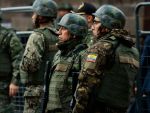Here’s Why Ecuador Raiding the Mexican Embassy is a Big Deal

People holding Mexican flags protest outside the Ecuadorian embassy in Mexico City on April 6, 2024, following the severance of diplomatic relations between the two countries. Ecuadorian authorities stormed the Mexican embassy in Quito on April 5 to arrest former vice president Jorge Glas, who had been granted political asylum there, prompting Mexico to sever diplomatic ties after the "violation of international law". (Photo by Yuri CORTEZ / AFP) (Photo by YURI CORTEZ/AFP via Getty Images)
Ecuador is facing international outrage after its forces broke into the Mexican Embassy in Quito to arrest former Ecuadorian VP Jorge Glas. Glas had been residing in the Embassy since last December and had recently been granted asylum by Mexico.
Mexico broke diplomatic ties with Ecuador over the incident and has said it will file a case against Ecuador at the International Court of Justice. Mexican President Andrés Manuel López Obrador called what happened a “flagrant violation of international law and the sovereignty of Mexico.”
The decision by Ecuador to storm the Mexican Embassy has been met with widespread condemnation across Latin America, with Presidents from all sides of the political spectrum releasing statements that support Mexico. Daniel Ortega, President of Nicaragua, has announced Nicaragua will join Mexico and break diplomatic ties with Ecuador in response to the raid.
Ironically, Nicaragua’s Embassy in Panama is currently housing former Panamanian President Ricardo Martinelli, who has been convicted of money laundering.

Colombia’s President Gustavo Petro said, “The Vienna Convention and Mexico’s sovereignty in Ecuador have been broken.” He added that Latin America “must keep alive the precepts of international law in the midst of the barbarism that is advancing in the world and the democratic pact within the continent.”
Argentina, Bolivia, Brazil, Chile, Cuba, Peru, Uruguay, and Venezuela were among the countries that quickly made comments in support of Mexico. The Mexican Foreign Ministry also thanked “the ambassadors of Germany, Panama, Cuba, Honduras, the president of the Ecuador-Mexico Chamber, and the rest of the diplomatic staff for their solidarity with the people of Mexico!” after the diplomatic staff of the Mexican Embassy in Quito was safely escorted to the airport and departed Quito for Mexico City.
Under international law, an embassy is considered part of the territory of the country they represent. The Vienna Convention, which governs international cooperation between states, establishes that a country cannot intrude upon an embassy on its territory without express permission from the ambassador.

This has led to protests in front of the Ecuadorian Embassy in Mexico.